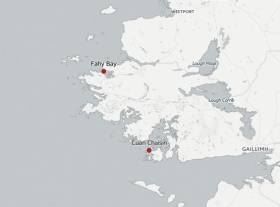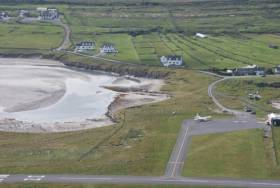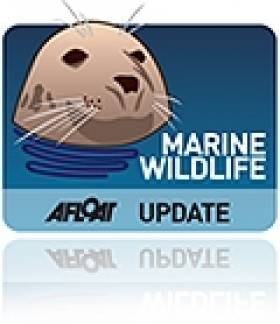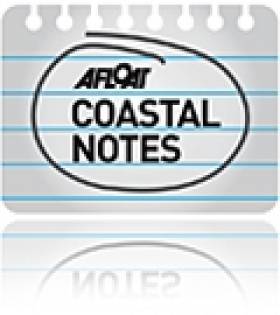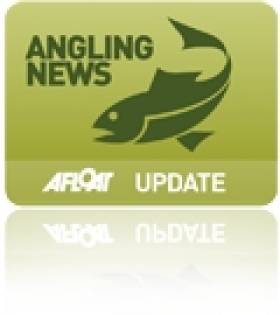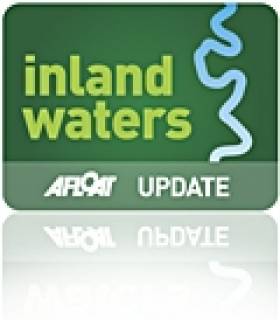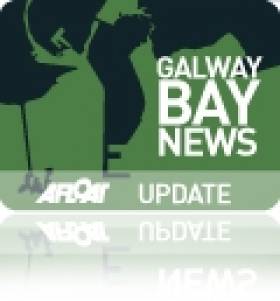Displaying items by tag: Connemara
#Shipwrecks - Two new shipwrecks have been discovered in Connemara in areas known to be used by smugglers in centuries past, as The Irish Times reports.
Currach fisherman John Bhaba Jeaic Ó Conghaíle found the skeletal remains of what's thought to be an 18th-century vessel at Cuan Chaisín in Ceantar na nOileáin.
Elsewhere, Fahy Bay resident Michael Barry located a second wreck, believed to date from the 19th century, near his home on the northwest Connemara coast – inshore from the Spanish Armada wreck Falco Blanco Mediano.
The area is known as the birthplace of sea captain George O'Malley, one of the most notorious smugglers of his day.
The Irish Times has much more on the story HERE.
#AranIslands - Inverin near Rossaveal in Connemara has been selected as the mainland terminal for the new Aran Islands air service tender, as Galway Bay FM reports.
The news will be some consolation to islanders angered by last year's award of the tender to Executive Helicopters, who planned to fly from the islands to Carnmore some 50km to the east of the Rossaveal ferry link.
That tender was cancelled at the end of September, with the previous contract with Aer Arann Islands later extended at the 11th hour, though it is set to expire this coming October.
More recently, MEP Marian Harkin visited the European Commission with two locals to voice their concerns over the particulars of any new tender for the vital air connection between the Aran Islands and the mainland.
Galway Bay FM has more on the story HERE.
Connemara Man Convicted of Illegal Fishing At Spiddal Pier
A Connemara man was convicted of an illegal fishing offence at Derrynea District Court on the 14th January. Before the court was Dara Conlon of Baile Liam, Spiddal, Co. Galway, who pleaded guilty to the possession of an illegally caught salmon at Spiddal Pier on the 2nd July, 2015. Mr. Conlon was observed fishing with a net close to the shore, not far from the mouth of the Boluisce River, and when searched he was found to be in possession of a salmon, which had been concealed under the net in his boat.
Judge Mary Fahy heard that the Boluisce River already suffers from very low salmon stocks, and due to the collapse in fish numbers it is now closed for angling. Conservation of the returning fish is very important to ensure as many salmon as possible can spawn, and to improve the low stock numbers. Given the importance of every fish to the river, she rejected the defence’s application to apply the Probation Act, and convicted Mr. Conlon on the charge of illegal possession of a salmon, fining him €100 with €450 costs.
Commenting on the case, Dr. John Conneely of Inland Fisheries Ireland (IFI), said: “The Boluisce River salmon stocks are extremely low compared to historical levels, and their survival in the river is under threat. Much investment of time and effort has gone into habitat improvement to improve fish stocks, and it is frustrating to see illegal fishing targeting a very vulnerable stock of fish. IFI Officers are committed to protecting the fish stocks of the catchment, and will continue to rigorously enforce fisheries legislation.”
CEO of IFI, Dr Ciaran Byrne, noted the importance of Salmon angling to rural areas, stating: “Such environmental crimes not only affect salmon stocks but also the ability of rural areas to attract visitors, support jobs and remain vibrant communities. I strongly urge the public to report any incidents of poaching or pollution to the IFI confidential 24 hour hotline on 1850 347424 and protect the fish, their habitat and rural communities.”
Connemara Fish Farms Need Freshwater Source
#FishFarm - Long-term solutions for freshwater treatment at Connemara fish farms are a priority as one local company seeks planning permission for a new pipeline, according to Galway Bay FM.
The moves come in the wake of recent controversy over illegal extraction of freshwater from lakes used to treat amoebic gill disease in salmon farms.
Údarás na Gaeltachta is now investigating longer-term freshwater availability for the growing aquaculture industry in south Connemara. Galway Bay FM has more HERE.
Council Warns Connemara Salmon Farms Over Illegal Freshwater Extraction
#FishFarm - Connemara's salmon farming industry has vowed to ensure it abides by all statutory regulations following the recent discovery of illegal freshwater extraction in the Kilkieran Bay area.
As Galway Bay FM reports, Galway County Council has been moved to write to the region's biggest salmon farming companies over their use of freshwater for disease control in their salmon farms.
This was prompted by the discovery of an illegal pumping system at Loch An Mhuilinn, similar to the unauthorised pipeline from Loughaunore that got Marine Harvest Ireland into trouble with the authorities last year.
Marine Harvest, along with the region's biggest producer Bradán Beo Teo, was sent a warning letter by the council in the wake of the latest find, for which it is not yet known who is responsible. The Connacht Tribune has more on the story HERE.
Sea Eagle Poisoned In Connemara 'Was About To Lay Eggs'
#MarineWildlife - The remains of a sea eagle – or white-tailed eagle – have been found in Connemara, and experts say the bird was poisoned.
RTÉ News reports on the discovery earlier this month of the female eagle, which was "within days" of laying eggs.
She was one of a pair that settled in the Roundstone area of Galway after her release in Killarney six years ago. Last year the pair laid eggs but they did not hatch.
The gruesome find marks the 13th poisoning of a sea eagle since they were reintroduced to the wild, and comes just weeks after the remains of another white-tailed eagle were found in Fermanagh.
Coastal News: Connemara 'Disappearing', Landfill Erodes Into Irish Sea, Plastic Pollutes Oceans
#CoastalNotes - Is Connemara at risk of disappearing into the sea? According to one geologist, that's a distinct possibility.
As the Irish Mirror reports, Jonathon Wilkins noticed that the tide was flooding channels in a peat bog near NUI Galway – a tell-tale sign of 'post-glacial rebound'.
That's the process of the land recovering from the weight of glaciers during the Ice Age, and in most cases it means the level of the earth is rising, such as northern parts of the island of Ireland.
But Connemara is one of those that's dropping, and slowing slipping below sea level as the seawater effectively dissolves the bogs and granite bedrock.
Wales-based geological expert Wilkins described what he saw as "very powerful evidence that sea level, to my surprise, is rising in this area, and demonstrably over quite a short time scale."
Disappearing even faster into the sea is an old landfill site in Bray – and it's raised the ire of environmentalists.
According to the Belfast Telegraph, the disused rubbish tip north of the Co Wicklow seaside town continues to lose some of its 200,000 tonnes of refuse into the Irish Sea due to coastal erosion.
And that's despite the problem being identified more than 20 years ago, according to Coastwatch – which says some 200 metres of the face of the landfill site has been exposed by weathering, littering the cliffs below.
The pollution only adds to the 8.8 millions tonnes of plastic that's dumped into the world's oceans every year, according to the journal Science.
The Irish Times reports on these latest findings, which show that one third of this plastic waste is produced by China alone.
Three Convicted Of Illegal Fishing In Connemara
#Angling - Three men were convicted of illegal fishing in Connemara in two separate cases at a sitting of Clifden District Court last Thursday (26 February).
In the first case, Judge Mary Fahy heard that Michael Coyne, of Leenane in Co Galway, was apprehended by fishery officers on 31 July 2014 in possession of two salmon.
The court heard that Fishery Officers on patrol in the Aasleagh area of Killary Harbour at night heard splashing in the water, and using a thermal imaging camera observed a man using a net. The officers went immediately to the area and apprehended Coyne in possession of salmon.
The judge was told that Coyne immediately admitted to illegal fishing. The court also heard that he was co-operative, and showed the officers where he had hidden three nets.
Judge Fahy convicted Coyne on two charges of illegal possession or a net, and the illegal use of a fixed engine, and fined him €600 with €200 costs.
On the same day, the court heard a case against Pat King and John Coneys, both with addresses in Ballyconneely, Co Galway.
Evidence was heard that on 27 July 2014, Assistant Inspector Sean Coady of Inland Fisheries Ireland was on patrol in the Ballyconneely area when he observed two men in a boat acting suspiciously.
He approached the men when they returned to shore, and found them in possession of a bag with a salmon in it.
Judge Fahy heard that the men immediately took responsibility, and were fully co-operative. Both men were convicted on one charge of the possession of an unlawfully caught salmon, and were fined €200 each plus €100 each for possession of the salmon. Costs of €250 each were also awarded against the men.
At the same sitting of Clifden District Court, Judge Fahy convicted a fish farm company for damage caused to a river bed in Co Galway.
Mannin Bay Salmon Company was before the court arising from an incident which occurred in July 2014, when fisheries Officers found the company had constructed a dam across the Bunowen River, which flows into Killary Harbour, in order to pump freshwater to a fish farm cage located offshore.
Significant damage was caused to the bed of the river, which is a spawning and nursery habitat for salmonids, and the dam was impeding the passage of fish.
The company pleaded guilty to the charge, and solicitor for the defence, Thomas Mannion, pleaded that the company had experienced an emergency situation whereby an outbreak of Amoebic Gill Disease threatened the stock of fish on the fish farm.
Amoebic Gill Disease can be treated by bathing fish in freshwater for a number of hours.
The defence acknowledged that the company knew it should not have dammed the river, but did so in order to avoid significant financial losses.
Convicting the company under Section 173 of the Fisheries Act 1959, Judge Fahy commented that protection of fish habitat was very important, but acknowledged that the company had been co-operative and had removed the dam and rectified the situation immediately once fisheries officers became aware of it. She fined the company €500 with €500 costs.
New Road Threat To Endangered Connemara Mussels
#Mussels - "Major concerns" abound over an endangered species of freshwater mussel after a Connemara roadway project given the go-ahead by planners before its design was finalised.
According to The Irish Times, locals expected the road project to be an upgrade of the existing route between Oughterard and Maam Cross, but only found out later that a wholly new road would be built through their land via compulsory purchase orders.
Besides splitting a number of farms in Glengowna near Oughterard, the final scheme will impact on the catchment of the Owenriff river, one of Europe's oldest trout hatcheries and host to one of the world's most important populations of the freshwater pearl mussel Margaritifera margaritifera.
And according to an independent ecologist, the presence of the latter means planning permission cannot be legally granted in the way it has been decided.
The Irish Times has much more on the story HERE.
Government Promises Review Of Seaweed Harvesting Rights
#Seaweed - Minister of State Kathleen Lynch has promised to review legislation pertaining to right for harvesting seaweed in Connemara over recent local concerns over commercial interests in the region.
As previously reported on Afloat.ie, coastal communities north of Galway Bay fear their rights to the traditional activity would be threatened by allowing larger businesses - such as the State-owned Arramara Teoranta - to move in.
Now Galway Bay FM reports that the Department of Environment has admitted there is a conflict between the Foreshore Act and the rights of private landowners on the coastline. More on the story HERE.



























